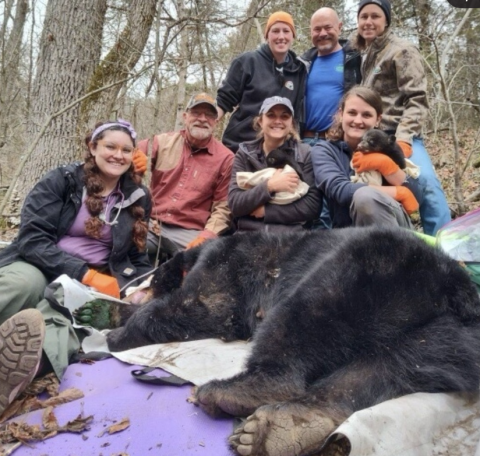
CKWRI's Dr. Clay Hilton Helping to Evaluate a Method to Safely Immobilize Denned Bears in Arkansas

The restoration of black bears in Arkansas is a wonderful conservation success story, and Arkansas Game and Fish Commission (AGFC) remains dedicated to monitoring the health of the population. It is estimated that the Arkansas bear population is over 5,000 AGFC monitors their population growth or decline closely. Caesar Kleberg Wildlife Research Institute’s Dr. Clay Hilton has been involved with a multi-year project focused on evaluating the efficacy of NalMed-A as a method to safely immobilize denned bears.
An important component of monitoring the population is done during the winter months while the bears are “denning”. As you can imagine, getting the immobilization component is an important part of the equation. The animal’s health and safety as well as the researcher’s safety are of the utmost priority. Historically, there has not been a great anesthesia protocol for denned bears because their physiology is very different from fully-awake bears.
In an effort to develop a safe and effective immobilization protocol for denning bears, Dr. Clay Hilton along with Myron Means (Arkansas Large Carnivore Program Coordinator), AJ Riggs, (Arkansas Wildlife Health Biologist), and Jenn Ballard, DVM, PhD (Arkansas Wildlife Veterinarian and Assistant Chief of Research) conducted a successful pilot study evaluating the efficacy of NalMed-A (a novel cocktail of drugs that Dr. Hilton helped develop via trials with research conducted at CKWRI’s Alkek Captive Ungulate Facility’s deer herd). The NalMed-A study proved to be safe and effective in fully awake bears, so the next step was using the drug on denning bears.
This past February, Dr. Hilton along with the team mentioned above and Carrie Ullmer, DVM (Head Veterinarian at Texas State Aquarium), and Lisa Lewis, DVM (Arkansas Game and Fish Commission Wildlife Medicine Fellow) conducted a pilot study (involving 10 bears) to determine the efficacy of NalMed-A on denned bears. The project was a success, and now the full study will be conducted on roughly 35 denned bars with the ultimate goal being a safe and effective standard protocol when it comes to immobilizing denning bears.
The final phase/full study will include the aforementioned team minus Dr. Lewis, along with Julie Balko, VMD (Board-certified veterinary anesthesiologist from NC State University’s College of Veterinary Medicine), and Morgan Rosenbaum, LVT (Licensed Veterinary Technologist from San Antonio Zoo and a graduate of Texas A&M University-Kingsville’s veterinary technology program).